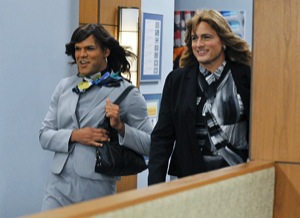
In the late seventies and early eighties my Dad, Jack Sandeen, worked at Disney Studios – first as a costumer, and then as the head of the wardrobe department. He worked on films such as Splash, The Apple Dumpling Gang and the original Tron. He passed away June 17, 2002 and I began my transition to Autumn Feb. 6 of the following year.
Disney, of course, now owns ABC and so somehow it seems personal when discussing a new television show scheduled to air in January, where cross-gender expression and costume are key elements to a temporary transvestite genre program. The new ABC program in question is called Work It and the first episode is scheduled to air Jan. 3, 2012.
The premise of the temporary transvestite genre, per Chris Straayer in the book Film Genre Reader III, includes the following:
“Temporary transvestite films share a large number of generic elements; the narrative necessity of disguise; adoption by a character of the opposite sex’s specifically gender-coded costume (and often its accessories, makeup, gestures, behaviors and attitudes); the simultaneous believability of this disguise to the film’s characters and its unbelievability to the film’s audience; visual, behavioral and narrative cues to the character’s ‘real’ sex; the transvestite character’s sensitization to the plight and pleasures of the opposite sex; references to the biological sex differences and the ‘necessary’ cultural separation of the sexes; a progression toward slap-stick comedy and increased physicality; heterosexual desire thwarted by the character’s disguise; accusation of homosexuality regarding the disguised character; romantic encounters that are mistakenly interpreted as homosexual or heterosexual; and ‘unmasking’ of the transvestite; and, finally, heterosexual coupling.”
And there is “necessity” for disguise: The temporary transvestism serves some need other than spectacle or theater. Generally, this need relates to problems of access, as in the case of getting a job, or escape.
In the brick-and-mortar world, many of us started our transitions with deep voices, heavy beards and bone structures that didn’t say “woman.” Many of us were – many of us are – visibly trans, not “passing” in our target sex of female.
As such, many of our experiences were as the objects of ridicule. I’ve personally been misgendered with male pronouns and referred to as “tranny,” “it” and “thing.”
And bluntly, the misogyny of the temporary transvestite genre is just wrongheaded. As well as boiling trans experiences down to horrid stereotypes, it also boils women’s experiences down to horrid stereotypes, and these stereotypes work against ordinary equality for trans people.
The genre may have been considered acceptable in years past, but most trans activists I’ve talked to about this believe this genre should no longer be considered acceptable. While Some Like It Hot is a comedic classic, it spoke to a different era.
Personally, I would really like Work It to just not see any airtime – I’d appreciate it if the company that employed my Dad for so many years did not air a show that has a premise that many of my peers in the community and I find deleterious to brick-and-mortar world trans people.
But, of course, the decision to air or not air the show is up to ABC. My opinion of ABC and Disney Studios will be incredibly low if they actually do air any episodes of this series.











ROTFL! This show is not even about the so-called “transgender” community. And it does no more harm to that imaginary community than a drag show does. In fact, this is just a straight version of a drag show. Men dressed up as women, parodying women, and everyone is in on the joke.
If this show does harm to anyone, it is to working women. It somewhat perpetuates the idea that women get preference in jobs over men in some fields. Yes, the female pharmacy rep is something of a stereotype, but in real life, if a man were denied such a job, he would hire a lawyer, not put on heels and a dress.
In a very real sense, this show is a cleaned up version of classic transvestite porn. Forced feminization is a common theme in such literature. A straight man is forced, by some circumstance, to dress as, and impersonate a woman. Robert Stoller wrote quite a bit, thought some of his conclusions are pretty much bogus.
No, this is not about harm to the transgender community, this is about LGBT activists trying to make a show of advocating for transgender people, and it is also about activists trying to throw their weight around. Personally, I could care less if the show airs or not. But I hate to see people making a big fuss just to get attention for a political cause I don’t care for.
Of course, the ironic thing is, I am quite sure that the Religious Right will be just as adamant against the show. Who knows, the show is stupid, but the coming fight might be really entertaining.
Oh well… The show aired for the first time last night, and while I can see where many who identify as transgender might feel like it was looking in the mirror, it appears that their efforts to influence ABC failed rather spectacularly. As I expected, while the show had several humorous moments, I thought it far more harmful to women than transgender people. The idea that a business could get away with “only hiring women” as pharmaceutical representatives, and that because doctors are interested in having sex with them (I find it interesting that all those “trans women” seemed to have no problem with this (hint: there are at least three problems in that plot twist) is very insulting to women. Women, like myself, have good reason to be insulted.